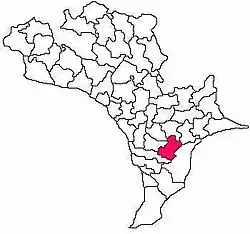Guduru mandal, Krishna district
Guduru mandal is one of the 50 mandals in Krishna district of the Indian state of Andhra Pradesh.[2] Its headquarters are located at Guduru. The mandal is bordered by Gudlavalleru mandal to the north, Pedana mandal to the east, Machilipatnam mandal to the south and Ghantasala mandal and Movva mandal to the west.[3]
Guduru | |
|---|---|
 Mandal map of Krishna district showing Guduru mandal (in Rose Colour) | |
.svg.png.webp) Guduru Location in Andhra Pradesh, India | |
| Coordinates: 16°N 81°E | |
| Country | India |
| State | Andhra Pradesh |
| District | Krishna |
| Headquarters | Guduru |
| Government | |
| • Body | Mandal Parishad |
| Area | |
| • Total | 124.70 km2 (48.15 sq mi) |
| Population (2011)[1] | |
| • Total | 49,228 |
| • Density | 390/km2 (1,000/sq mi) |
| Languages | |
| • Official | Telugu |
| Time zone | UTC+5:30 (IST) |
| Vehicle registration | AP 16 |
Demographics
As of 2011 census, the mandal had a population of 49,229 living in 14,310 households. The total population constituted 24,823 males and 24,405 females, for a sex ratio of 983 females per 1000 males.[4] There were 4,115 children aged 6 years or below, of which 2,176 were boys and 1,939 were girls, for a sex ratio of 891females per 1000 males. The average literacy rate stood at 72.09% with 32,523 literates, of which 17,302 were males and 15,221 were females. There were 6,946 members of Scheduled Castes and 698 members of Scheduled Tribes.
Labor Statistics
As per the report published by Census of India in 2011, 26,601 people had a job, including 15,921 males and 10,680 females. As of the census, 21,802 workers described their job as main job, 3,503 worked as cultivators, 11,205 as agricultural labourers, 3,767 in household industry and 3,f327 were involved in some other kind of work. Of these, only 4,799 were marginal workers.[5]
Administration
Guduru mandal is administered under the Avanigadda Assembly constituency of the Machilipatnam Lok Sabha constituency.[6] It is one of the twelve mandals those administration falls under Machilipatnam revenue division.
Towns and villages
As of 2011 census, there are a total of 25 settlements in the mandal. Guduru is the largest and Gandram is the smallest in terms of population.[7]
The settlements in the mandal are:
- Akulamannadu
- Akumarru
- Chittigudur
- Gandram
- Gudur
- Gurijepalle
- Idugullapalle
- Jakkamcherla
- Kalapatam
- Kanchakodur
- Kankatava
- Kappaladoddi
- Kokanarayanapalem
- Lellagaruvu
- Maddipatla
- Mallavolu
- Mukkollu
- Narikedalapalem
- Pinagudurulanka
- Polavaram
- Ramannapeta
- Ramanuja Varthalapalle
- Ramarajupalem
- Rayavaram
- Tarakaturu
Education
The mandal plays a major role in education for the rural students of nearby villages. The primary and secondary school education is imparted by government, aided by private schools, under the School Education Department of the state.[8] As per the school information report for the academic year 2015–16, the mandal has more than 4,077 students enrolled in over 67 schools.[9][10]
See also
- List of mandals in Andhra Pradesh
- Vijayawada
References
- "Census 2011" (PDF). The Registrar General & Census Commissioner, India. p. 448. Retrieved 6 November 2017.
- "Guduru Mandal - Krishna". Retrieved 6 November 2017.
- "Krishna Mandal Map". Maps of India. Retrieved 6 November 2017.
- "Population of Guduru mandal". India Growing. Retrieved 6 November 2017.
- "Guduru Mandal Population, Caste, Religion Data". Census 2011. Retrieved 6 November 2017.
- "Delimitation of Parliamentary and Assembly Constituencies Order, 2008" (pdf). Election Commission of India. pp. 20, 31. Retrieved 6 November 2017.
- "Villages in Guduru mandal". Retrieved 6 November 2017.
- "School Education Department" (PDF). School Education Department, Government of Andhra Pradesh. Archived from the original (PDF) on 27 December 2015. Retrieved 6 November 2017.
- "R1.1 SCHOOL INFORMATION". Archived from the original on 8 November 2016. Retrieved 6 November 2017.
- "Student Information Report". Commissionerate of School Education. Child info 2015-16, District School Education - Andhra Pradesh. Retrieved 6 November 2017.